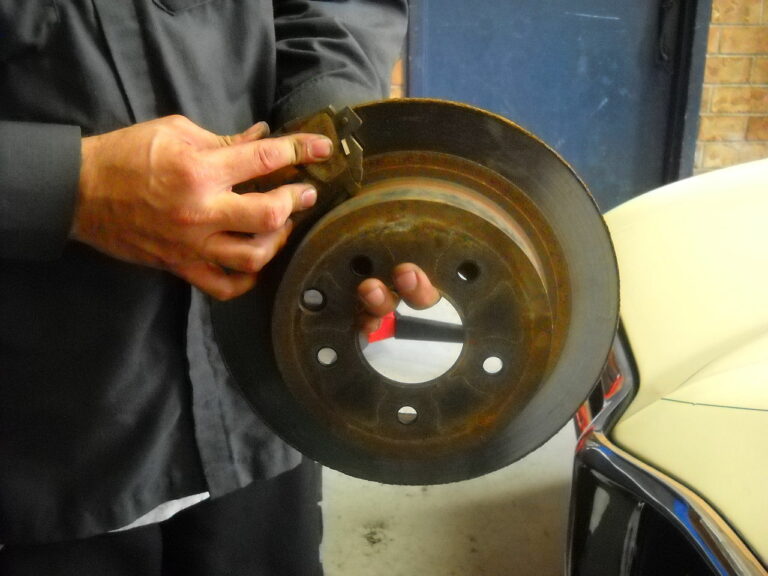Why Are My Brakes Making A Scraping Noise

Ah, that dreaded scraping sound. It's a noise that sends shivers down the spine of even the most seasoned automotive professional. Brake noises, especially scraping, are rarely benign. Ignoring them can lead to diminished braking performance, costly repairs, and even dangerous situations. Let's dive deep into the common culprits behind that metallic lament and how to diagnose them.
Worn Brake Pads: The Usual Suspect
The most frequent offender, by a wide margin, is simply worn-out brake pads. Brake pads are designed to wear down over time as they create friction against the brake rotors to slow the vehicle. Most pads have a wear indicator – a small metal tab that's designed to contact the rotor when the pad material becomes thin. This contact creates a high-pitched squeal, often before the scraping starts. However, if ignored long enough, the pad material will completely wear away, leaving the metal backing plate to grind directly against the rotor. This is where the scraping noise comes from, and it's a serious problem. Continued driving in this condition will severely damage the rotors, necessitating their replacement in addition to the pads.
Diagnosis: Visually inspect the brake pads. Jack up the car, remove the wheel, and look at the pad thickness. If the pad material is less than 1/8 inch thick, or if you can see the metal backing plate, it's time for new pads. You can also use a specialized brake pad thickness gauge for a more accurate reading.
Damaged Brake Rotors: A Consequence of Neglect
As mentioned above, worn brake pads left unchecked will almost certainly lead to damaged brake rotors. Rotors are typically made of cast iron, and the constant grinding of metal on metal creates deep grooves and scoring on the rotor surface. In severe cases, the rotor can even become warped, leading to pulsing during braking in addition to the scraping sound.
Diagnosis: Inspect the rotors for deep grooves, scoring, or warping. Run your finger across the surface (when cool, of course!). If you feel significant imperfections, the rotors likely need to be resurfaced (if enough material remains) or replaced. A qualified mechanic can measure rotor thickness with a micrometer to determine if they are within the manufacturer's specified tolerance.
Foreign Objects: Rocks, Debris, and More
Sometimes, the scraping sound isn't due to worn parts but rather a foreign object lodged between the brake pad and the rotor. Small rocks, gravel, or even larger debris can get caught in this area, causing a loud and irritating scraping noise. This is especially common when driving on gravel roads or in areas with construction.
Diagnosis: This can be tricky to diagnose without removing the wheel. Sometimes, you can visually spot the object if you look carefully behind the wheel. If not, you'll need to jack up the car, remove the wheel, and inspect the area between the pad and rotor. Carefully remove the object with a screwdriver or pliers.
Rust and Corrosion: A Temporary Annoyance
Vehicles that sit for extended periods, or are frequently driven in wet or salty environments, can develop rust on the brake rotors. This surface rust can cause a scraping noise, especially during the first few brake applications after the vehicle has been sitting. The noise usually disappears after the rust is worn away by normal braking.
Diagnosis: This is usually self-diagnosing. If the scraping noise is only present after the car has been sitting and disappears after a few stops, it's likely just surface rust. If the noise persists, even after repeated braking, then look for other potential causes.
Sticking Calipers: A More Serious Issue
A sticking brake caliper can also cause a scraping noise. Calipers contain pistons that push the brake pads against the rotors. If a caliper piston is seized or sticking, it can cause the pad to constantly rub against the rotor, even when the brakes are not applied. This constant friction generates heat and can cause the pads to wear out prematurely, leading to the dreaded scraping sound.
Diagnosis: Check for uneven brake pad wear. If one pad is significantly thinner than the other on the same wheel, a sticking caliper is a likely culprit. Also, after driving, carefully touch the wheel hub near the caliper (avoid touching the rotor directly, as it may be hot). If one wheel hub is significantly hotter than the others, it indicates a possible sticking caliper.
Conclusion
A scraping noise emanating from your brakes is a sign that something isn't right. While it could be something as simple as a small rock, it could also indicate a more serious problem like worn brake pads, damaged rotors, or a sticking caliper. Proper diagnosis is crucial to ensure your safety and prevent costly repairs. If you're not comfortable diagnosing or repairing your brakes yourself, it's always best to consult a qualified mechanic.
